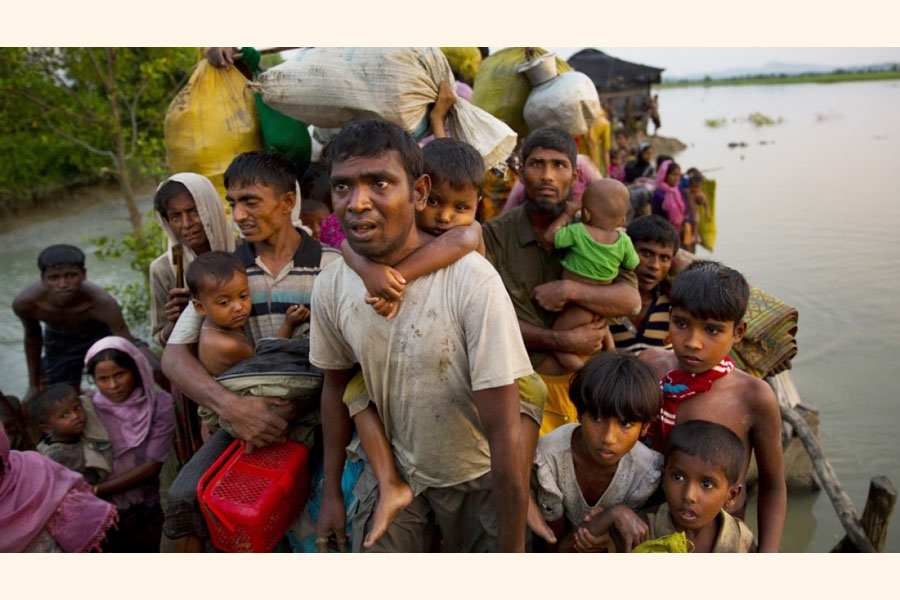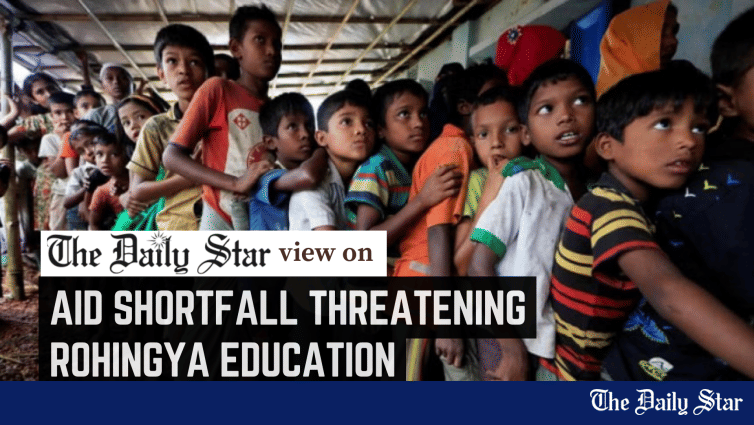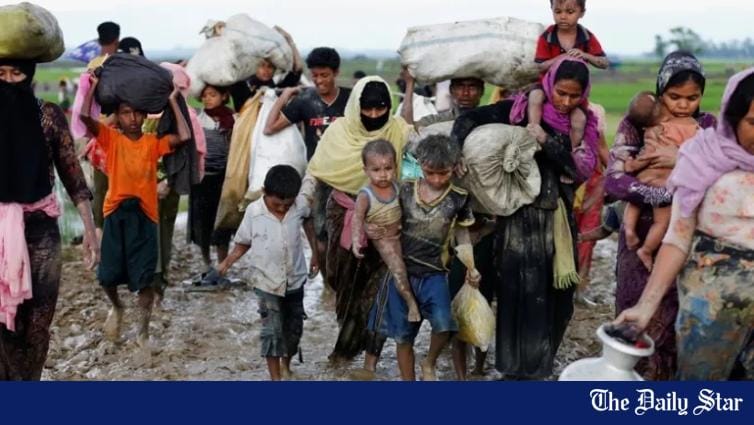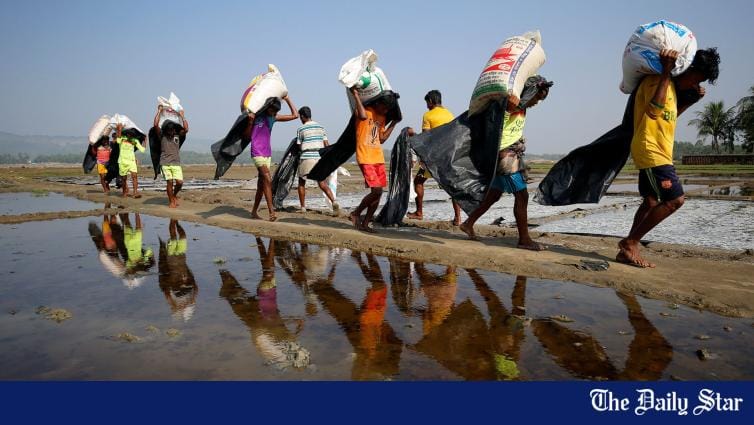Saif
Senior Member
- Joined
- Jan 24, 2024
- Messages
- 15,416
- Nation

- Axis Group

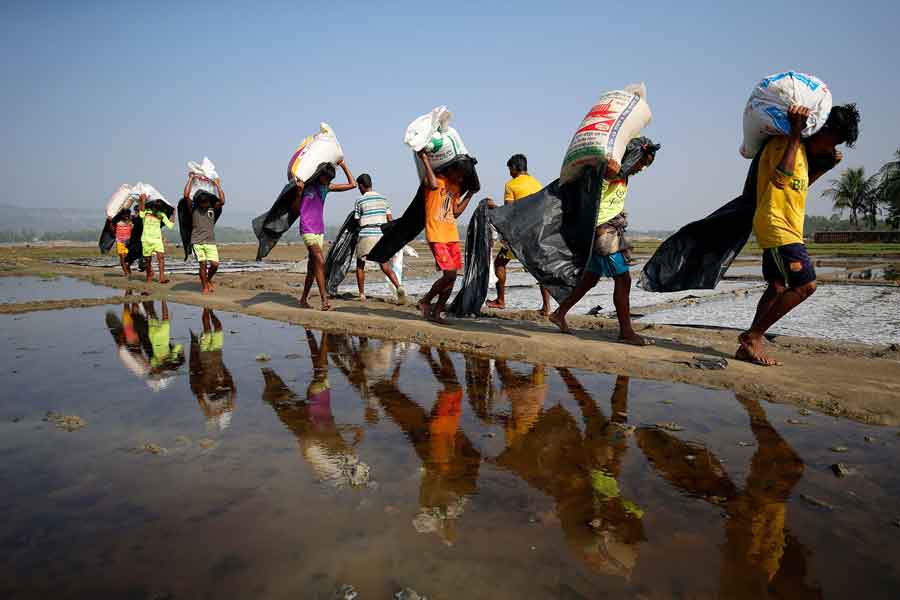
Plight of Rohingya refugees continues to intensify
In the second week of July UNHCR spokesperson Babar Baloch in a press briefing at the Palais des Nations in Geneva has indicated that UNHCR, the UN Refugee Agency, and humanitarian partners are mobilising to respond to the needs of up to 150,000 Rohingya refugees who have arrived at Cox's Bazar, Ba
Plight of Rohingya refugees continues to intensify
Muhammad Zamir
Published :
Jul 20, 2025 23:13
Updated :
Jul 20, 2025 23:13

LABOUR: Rohingya refugee workers carrying bags of salt this month in a processing yard in Cox's Bazar, Bangladesh. Photo : REUTERS/Mohammad Ponir Hossain/Files
In the second week of July UNHCR spokesperson Babar Baloch in a press briefing at the Palais des Nations in Geneva has indicated that UNHCR, the UN Refugee Agency, and humanitarian partners are mobilising to respond to the needs of up to 150,000 Rohingya refugees who have arrived at Cox's Bazar, Bangladesh over the last 18 months.
In this context, it has been highlighted that "targeted violence and persecution in Rakhine State and the ongoing conflict in Myanmar have continued to force thousands of Rohingyas to seek protection in Bangladesh". This movement of Rohingya refugees into Bangladesh, spread over months, has been the largest from Myanmar since 2017, when some 750,000 fled the deadly violence in their native Rakhine State.
While this was the largest Rohingya exodus into Bangladesh, it was not the first. Myanmar's persecution of the Rohingya has long been an issue of concern, with significant refugee flows into Bangladesh in 1978 and 1991-92.
Since the civil war erupted in Myanmar in 2021, this influx has continued unabated. As of today, over one million Rohingya live in Bangladesh. Most of them are hosted in 33 camps in Cox's Bazar district and over 36,000 have been relocated to Bhasan Char, an island in Noakhali district.
Bangladesh has been generously hosting Rohingya refugees from Myanmar for more than three decades. In Cox's Bazar, these new arrivals join another nearly 1 million Rohingya refugees crowded in just 24 square kilometres of space - making the camps one of the world's most densely populated places. To ease the situation a good number of them has been moved to Bhasan Char where different facilities, including healthcare have been made available.
Bangladesh is home to the largest number of Rohingya refugees in the world. Understanding the country's role is therefore essential to comprehend the complexities of the Rohingya condition.
It needs to be understood that Bangladesh does not have a national refugee policy. Therefore, it deals with refugees on a largely ad-hoc basis, relying on administrative instruments and directives. It is not a signatory to the international refugee instruments of 1951 and 1967. Consequently, the Rohingya are not legally recognised as refugees.
However, the Chief Adviser of the current Interim Government, Prof. Muhammad Yunus, has recently indicated that the Rohingya in Bangladesh are considered refugees for all practical purposes. However, as refugees, though Rohingyas do not get the same rights as citizens, they according to Article 31 of Bangladesh's Constitution (which protects every person within Bangladesh against any action detrimental to their life, liberty, and property) have an unalienable right to the application of the provision under Article 31.
Consequently, Bangladesh works with UN agencies and a vast network of domestic and foreign non-profit organisations to provide shelter, food, water, healthcare, and basic assistance to the Rohingyas. Such engagement includes adult education, vocational training, and social awareness campaigns. It also needs to be mentioned here that immunisation programmes for them have been successful in reducing outbreak of cholera and curbing the spread of Covid-19 during the pandemic. Although there is no access to formal education, the Rohingya refugees are taught through over 3,000 community learning centres that are mostly supported by UNICEF. Though legally forbidden from working in Bangladesh, nearly half of the Rohingya residents in the country claim to be engaged in the informal sector. The camps are also active sites of economic activity, like trade, services, and small manufacturing.
Dhaka's widely-praised efforts to address the Rohingya crisis are shaped by a range of factors that include both practicality and altruism. Its appeal for a 'sustainable' repatriation of the Rohingya is a demonstration of the intermingling of these factors. This emphasis puts the onus on Myanmar to find a durable solution for the Rohingya and assure long-term rights.
Unfortunately, as evident from Bangladesh's experience, without an enduring political solution from within Myanmar, this cyclical influx will be perpetual. Other practical considerations shaping Bangladesh's approach are significant challenges related to funding, overcrowding, and security.
The Rohingya crisis continues to be a significant challenge not only for the refugees but also Bangladesh. Bangladesh's capacity is stretched thin, with resource scarcity and security challenges exacerbating the situation. The UN Secretary-General's recent visit to see for himself the Rohingya situation in Bangladesh underscored the need to keep this crisis at the forefront of global priorities. As a host state, Bangladesh's efforts are critical to managing the crisis, but durable solutions require greater and more concerted international cooperation.
Among the new arrivals, nearly 121,000 had been biometrically identified by the end of June, with more believed to be residing informally in the already overcrowded refugee camps. The overwhelming majority are women and children.
More humanitarian support is urgently required as the new arrivals are largely dependent on the solidarity of those living in the camps, overstretching severely diminished resources. Biometric identification has allowed humanitarian partners in Bangladesh to provide the new arrivals with basic services, including food, medical care, education and essential relief items. However, this will soon dry up without an immediate injection of funds. Access to shelter and other key necessities is also insufficient in the face of limited resources.
With the acute global funding crisis, the critical needs of both newly-arrived refugees and those already present, in all likelihood will be unmet and essential services are at risk of collapsing.
Unless additional funds are secured, health services will be severely disrupted by September and essential cooking fuel (LPG) will run out. By December, food assistance will stop. Education for some 230,000 children - including 63,000 new arrivals - is also at risk of being discontinued.
Refugees in the camps have already felt the impact of these reductions. They fear more cuts are looming. This is fueling a sense of desperation and anxiety, and driving some to embark on dangerous sea journeys to other countries in search of safety and a more dignified life for their families..
UNHCR and humanitarian partners are grateful that the government of Bangladesh has authorised newly-arrived Rohingya refugees to access emergency assistance and key services in the camps in Cox's Bazar. Nevertheless, some analysts involved with human rights have been advocating that as the conflict in Myanmar continues unabated, the Bangladeshi authorities need to provide managed access to safety and asylum for civilians fleeing the conflict.
Such an approach is being sought because over the years, the generous support from Bangladesh and the international community has been critical in meeting Rohingya refugees' most basic needs and providing protection.
However, currently every aspect of the refugee response is affected by fund scarcity. Accordingly, UNHCR and its humanitarian partners are also calling on the international community to stand in solidarity with Bangladesh and other countries. It is being stressed that the international community must continue to support the efforts for providing life-saving assistance to the Rohingya refugees until the situation in Myanmar's Rakhine State is conducive to their safe and voluntary return.
The United Nations has correctly observed that Rohingya refugees are in peril in Bangladesh as international financial support has waned.
Such an approach could definitely and rapidly affect the plight of Rohingya refugees in Bangladesh which is bound to rapidly deteriorate further unless more funding can be secured for critical assistance services, according to the United Nations refugee agency.
United Nations High Commissioner for Refugees (UNHCR) spokesperson Babar Baloch has told reporters "there is a huge gap in terms of what we need and what resources are available. These funding gaps will affect the daily living of Rohingya refugees as they depend on humanitarian support on a daily basis for food, health and education."
Many involved with this crisis have also observed that the humanitarian sector has been churned by funding reductions from major donors, led by the United States under President Donald Trump and other Western countries, as they appear to be prioritizing defence spending prompted by growing concerns over Russia and China.
At the same time Baloch has added that "due to the acute global funding crisis, the critical needs of both newly arrived refugees and those already present will be unmet, and essential services for the whole Rohingya refugee population are at risk of collapsing unless additional funds are secured."
It has also been noted that if enough funding is not secured, health services will be severely disrupted by September, and by December, essential food assistance will stop according to the UNHCR. They have informed that their appeal for US Dollar 255 million has only been 35 percent funded. It may be recalled that in March, the World Food Programme announced that "severe funding shortfalls" for Rohingya were forcing a cut in monthly food vouchers from US Dollar 12.50 to US Dollar 6 per person.
Muhammad Zamir, a former Ambassador is an analyst specialised in foreign affairs, right to information and good governance.
Muhammad Zamir
Published :
Jul 20, 2025 23:13
Updated :
Jul 20, 2025 23:13
LABOUR: Rohingya refugee workers carrying bags of salt this month in a processing yard in Cox's Bazar, Bangladesh. Photo : REUTERS/Mohammad Ponir Hossain/Files
In the second week of July UNHCR spokesperson Babar Baloch in a press briefing at the Palais des Nations in Geneva has indicated that UNHCR, the UN Refugee Agency, and humanitarian partners are mobilising to respond to the needs of up to 150,000 Rohingya refugees who have arrived at Cox's Bazar, Bangladesh over the last 18 months.
In this context, it has been highlighted that "targeted violence and persecution in Rakhine State and the ongoing conflict in Myanmar have continued to force thousands of Rohingyas to seek protection in Bangladesh". This movement of Rohingya refugees into Bangladesh, spread over months, has been the largest from Myanmar since 2017, when some 750,000 fled the deadly violence in their native Rakhine State.
While this was the largest Rohingya exodus into Bangladesh, it was not the first. Myanmar's persecution of the Rohingya has long been an issue of concern, with significant refugee flows into Bangladesh in 1978 and 1991-92.
Since the civil war erupted in Myanmar in 2021, this influx has continued unabated. As of today, over one million Rohingya live in Bangladesh. Most of them are hosted in 33 camps in Cox's Bazar district and over 36,000 have been relocated to Bhasan Char, an island in Noakhali district.
Bangladesh has been generously hosting Rohingya refugees from Myanmar for more than three decades. In Cox's Bazar, these new arrivals join another nearly 1 million Rohingya refugees crowded in just 24 square kilometres of space - making the camps one of the world's most densely populated places. To ease the situation a good number of them has been moved to Bhasan Char where different facilities, including healthcare have been made available.
Bangladesh is home to the largest number of Rohingya refugees in the world. Understanding the country's role is therefore essential to comprehend the complexities of the Rohingya condition.
It needs to be understood that Bangladesh does not have a national refugee policy. Therefore, it deals with refugees on a largely ad-hoc basis, relying on administrative instruments and directives. It is not a signatory to the international refugee instruments of 1951 and 1967. Consequently, the Rohingya are not legally recognised as refugees.
However, the Chief Adviser of the current Interim Government, Prof. Muhammad Yunus, has recently indicated that the Rohingya in Bangladesh are considered refugees for all practical purposes. However, as refugees, though Rohingyas do not get the same rights as citizens, they according to Article 31 of Bangladesh's Constitution (which protects every person within Bangladesh against any action detrimental to their life, liberty, and property) have an unalienable right to the application of the provision under Article 31.
Consequently, Bangladesh works with UN agencies and a vast network of domestic and foreign non-profit organisations to provide shelter, food, water, healthcare, and basic assistance to the Rohingyas. Such engagement includes adult education, vocational training, and social awareness campaigns. It also needs to be mentioned here that immunisation programmes for them have been successful in reducing outbreak of cholera and curbing the spread of Covid-19 during the pandemic. Although there is no access to formal education, the Rohingya refugees are taught through over 3,000 community learning centres that are mostly supported by UNICEF. Though legally forbidden from working in Bangladesh, nearly half of the Rohingya residents in the country claim to be engaged in the informal sector. The camps are also active sites of economic activity, like trade, services, and small manufacturing.
Dhaka's widely-praised efforts to address the Rohingya crisis are shaped by a range of factors that include both practicality and altruism. Its appeal for a 'sustainable' repatriation of the Rohingya is a demonstration of the intermingling of these factors. This emphasis puts the onus on Myanmar to find a durable solution for the Rohingya and assure long-term rights.
Unfortunately, as evident from Bangladesh's experience, without an enduring political solution from within Myanmar, this cyclical influx will be perpetual. Other practical considerations shaping Bangladesh's approach are significant challenges related to funding, overcrowding, and security.
The Rohingya crisis continues to be a significant challenge not only for the refugees but also Bangladesh. Bangladesh's capacity is stretched thin, with resource scarcity and security challenges exacerbating the situation. The UN Secretary-General's recent visit to see for himself the Rohingya situation in Bangladesh underscored the need to keep this crisis at the forefront of global priorities. As a host state, Bangladesh's efforts are critical to managing the crisis, but durable solutions require greater and more concerted international cooperation.
Among the new arrivals, nearly 121,000 had been biometrically identified by the end of June, with more believed to be residing informally in the already overcrowded refugee camps. The overwhelming majority are women and children.
More humanitarian support is urgently required as the new arrivals are largely dependent on the solidarity of those living in the camps, overstretching severely diminished resources. Biometric identification has allowed humanitarian partners in Bangladesh to provide the new arrivals with basic services, including food, medical care, education and essential relief items. However, this will soon dry up without an immediate injection of funds. Access to shelter and other key necessities is also insufficient in the face of limited resources.
With the acute global funding crisis, the critical needs of both newly-arrived refugees and those already present, in all likelihood will be unmet and essential services are at risk of collapsing.
Unless additional funds are secured, health services will be severely disrupted by September and essential cooking fuel (LPG) will run out. By December, food assistance will stop. Education for some 230,000 children - including 63,000 new arrivals - is also at risk of being discontinued.
Refugees in the camps have already felt the impact of these reductions. They fear more cuts are looming. This is fueling a sense of desperation and anxiety, and driving some to embark on dangerous sea journeys to other countries in search of safety and a more dignified life for their families..
UNHCR and humanitarian partners are grateful that the government of Bangladesh has authorised newly-arrived Rohingya refugees to access emergency assistance and key services in the camps in Cox's Bazar. Nevertheless, some analysts involved with human rights have been advocating that as the conflict in Myanmar continues unabated, the Bangladeshi authorities need to provide managed access to safety and asylum for civilians fleeing the conflict.
Such an approach is being sought because over the years, the generous support from Bangladesh and the international community has been critical in meeting Rohingya refugees' most basic needs and providing protection.
However, currently every aspect of the refugee response is affected by fund scarcity. Accordingly, UNHCR and its humanitarian partners are also calling on the international community to stand in solidarity with Bangladesh and other countries. It is being stressed that the international community must continue to support the efforts for providing life-saving assistance to the Rohingya refugees until the situation in Myanmar's Rakhine State is conducive to their safe and voluntary return.
The United Nations has correctly observed that Rohingya refugees are in peril in Bangladesh as international financial support has waned.
Such an approach could definitely and rapidly affect the plight of Rohingya refugees in Bangladesh which is bound to rapidly deteriorate further unless more funding can be secured for critical assistance services, according to the United Nations refugee agency.
United Nations High Commissioner for Refugees (UNHCR) spokesperson Babar Baloch has told reporters "there is a huge gap in terms of what we need and what resources are available. These funding gaps will affect the daily living of Rohingya refugees as they depend on humanitarian support on a daily basis for food, health and education."
Many involved with this crisis have also observed that the humanitarian sector has been churned by funding reductions from major donors, led by the United States under President Donald Trump and other Western countries, as they appear to be prioritizing defence spending prompted by growing concerns over Russia and China.
At the same time Baloch has added that "due to the acute global funding crisis, the critical needs of both newly arrived refugees and those already present will be unmet, and essential services for the whole Rohingya refugee population are at risk of collapsing unless additional funds are secured."
It has also been noted that if enough funding is not secured, health services will be severely disrupted by September, and by December, essential food assistance will stop according to the UNHCR. They have informed that their appeal for US Dollar 255 million has only been 35 percent funded. It may be recalled that in March, the World Food Programme announced that "severe funding shortfalls" for Rohingya were forcing a cut in monthly food vouchers from US Dollar 12.50 to US Dollar 6 per person.
Muhammad Zamir, a former Ambassador is an analyst specialised in foreign affairs, right to information and good governance.

